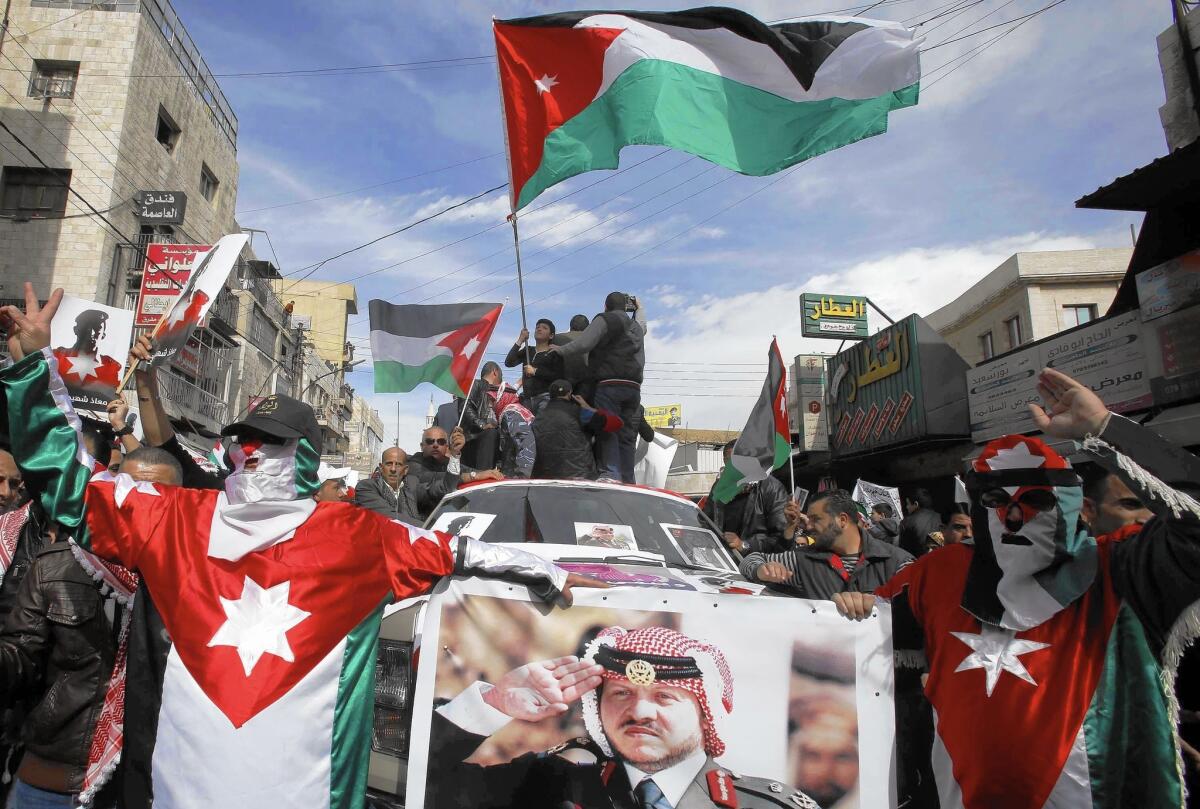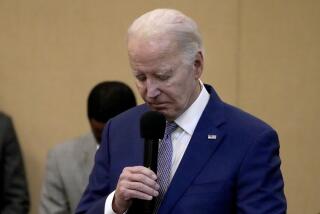Pilot’s death bolsters Jordanian support for bombing of Islamic State

- Share via
Reporting from Amman, Jordan — The gruesome killing of a Jordanian pilot at the hands of Islamic State militants has unleashed a wave of revulsion, demands for retribution and pro-government rallies across the kingdom.
The cry for revenge has also drowned out dissenting voices, especially from Jordan’s powerful Islamist bloc, the largest political force opposed to the Washington-backed monarchy of King Abdullah II.
Lt. Moaz Kasasbeh’s elevation to national martyr status has abruptly made opposition to Jordan’s participation in the U.S.-led bombing campaign against Islamic State appear unpatriotic, if not treasonous. The immolation of Kasasbeh, captured after his F-16 crashed in Syria while he was on a mission with the U.S.-led coalition, has narrowed what is considered acceptable public debate.
“Sitting in a gray area is no longer acceptable,” said Oraib Rintawi, director of the Amman-based Al Quds Center for Political Studies. “Public opinion is very angry.”
Before the killing was confirmed, many Jordanians — including the pilot’s father and other members of his influential southern tribe — openly questioned any participation in the air campaign, declaring it was not Jordan’s fight. Besides fear for air crews’ safety, some voiced concern about possible Islamic State reprisal attacks in Jordan.
But exuberant endorsement of the aerial bombardment has now become a virtual test of loyalty. Martial scenes and bellicose declarations from the king and others have replaced the normally drab fare of state television. The pilot’s father has called for the “annihilation” of Islamic State.
Highlighting the robust response was a series of stepped-up Royal Jordanian Air Force assaults on militant positions, including strikes Friday near the northern Syrian city of Raqqah, a militant stronghold. More strikes were reported Saturday.
Islamic State said Friday’s bombardment killed a U.S. hostage, aid worker Kayla Mueller, 26, an assertion that U.S. and Jordanian authorities viewed with skepticism.
Jordanian airstrikes Friday, carried out with U.S. military support, hit a militant weapons storage compound outside Raqqah, said Navy Cmdr. Elissa Smith, a Pentagon spokeswoman.
“We have seen no indications that hostages were being held at this location,” Smith said via email.
The militants have offered no proof that Mueller was killed.
Mueller’s family in Arizona issued a statement saying they were still “hopeful that Kayla is alive.”
The United Arab Emirates announced on Saturday that a squadron of F-16 fighter jets would be stationed in Jordan. It was unclear whether the Emirati warplanes would be joining in sorties against Islamic State. The Emirates had pulled out of the bombing missions after the Jordanian pilot was captured, reportedly expressing concern about inadequate rescue resources for downed air crews.
Here in Jordan, the clamor for payback is unfolding against a complex social and political backdrop.
Though a close U.S. ally, Jordan has long been a hotbed of Sunni Islamic militancy. It was the birthplace of Abu Musab Zarqawi, the notorious founder of Al Qaeda in Iraq, the predecessor of Islamic State. Zarqawi, who was killed in a 2006 U.S. airstrike in Iraq, is a still a revered figure in militant circles.
Hundreds of Islamists remain in jails here. Sajida Rishawi, a participant in bloody Al Qaeda attacks almost a decade ago on Amman hotels, was promptly executed after word of the pilot’s killing.
By some estimates, Jordan has provided about 1,500 recruits for Islamic State and Al Qaeda-affiliated Al Nusra Front, the two most radical rebel groups fighting in Syria.
The kingdom’s role as a de facto rear base for Syrian rebels has stoked Islamist sentiment, despite close U.S. and Jordanian cooperation on assisting Syrian rebel factions. Recruits into more moderate U.S.-backed Syrian rebel formations have often ended up joining extremist factions. Many fighters view the Syrian conflict as sectarian struggle pitting Sunni Muslims, the dominant sect here and in neighboring Syria, against the Syrian government’s Shiite-linked leadership.
But the pilot’s death has put Jordan’s Sunni Islamist parties squarely on the defensive.
“The Islamists now need to take a clear position regarding issues of terror and terrorists,” said Rintawi, the political scientist.
Clearly feeling the heat is the nation’s most powerful opposition bloc, Islamic Action Front, the local wing of the Muslim Brotherhood, the international Islamist movement founded in Egypt.
“This is a rare moment of popular isolation for the Brotherhood,” Jordanian commentator Nahedh Hattar wrote Friday in the Lebanese daily Al Akhbar.
From the outset, Islamic Action Front, which is generally viewed as moderate, has unequivocally opposed the government’s involvement in the air campaign.
In December, the group issued a religious edict forbidding Jordanian military involvement in “alliances with the West against Islamic nations,” a pointed rebuff of the U.S.-led alliance.
“We confirm our rejection of any participation in this coalition and this war, whose price will only be paid by the sons of this nation with their blood, safety, and stability,” the group said.
After Kasasbeh’s slaying, many who left comments on an Internet posting of a video interview with Sheik Hamza Mansour, leader of Islamic Action Front, excoriated what they viewed as the Brotherhood’s collaborationist stance on the militants.
“The Muslim Brotherhood are the intelligence dogs of Daesh!” commented one online user, referring to Islamic State by its Arabic acronym — a pejorative, according to the group’s followers.
In recent days, Islamic Action Front has moved swiftly into damage-control mode, condemning the pilot’s killing and distancing itself from Islamic State.
Brotherhood leaders were quick to join the lines of mourners in the Kasasbeh tribe’s home village of Ay outside the city of Karak, south of Amman. Party officials paying respects at the tribal mourning tent issued a statement praising “the martyr hero Moaz.”
Still, the Brotherhood and its local affiliate have not backed down from their position against Jordan’s wider involvement.
“Our position is clear.... This [U.S.-led air war] is not in the interest of Jordan and not in the interest of the Arabs and the Muslims,” Mansour said in a telephone interview.
“We are against Daesh’s practices that are represented by burning and beheading,” he said. “But we are against the intervention of the foreigner in Arab and Islamic lands.”
Facing even greater pressure are hard-line Islamic parties who adhere to Salafist thought, an austere interpretation of Islam. Some wary Jordanians view the country’s large Salafist community as a shadow supporter of Islamic State and Al Qaeda, though mainstream Salafist preachers deny any link.
Despite the highly charged atmosphere, opposition to Jordan’s involvement in the U.S.-led coalition is not out of line with popular sentiment, said Mohammad Shalabi, the Salafist party leader better known as Abu Sayyaf.
“We are part of the street,” Shalabi said in a telephone interview. “We are not coming from Mars.”
An overreaction to Kasasbeh’s brutal killing, he said, would probably bolster extremists, who thrive on the image of U.S. and its allies victimizing Muslims.
“If we just bomb the Islamic State, this will breed resentment,” Shalabi said. “They may smuggle in people who will execute a terrorist attack.”
But even as he spoke, state TV flashed images of an F-16 superimposed on a national flag, as a narrator cheered “the eagles of Jordan” attacking the “lairs of this cowardly group.”
Special correspondent Bulos reported from Amman, and Times staff writer McDonnell reported from Beirut.
Twitter: @mcdneville
More to Read
Sign up for Essential California
The most important California stories and recommendations in your inbox every morning.
You may occasionally receive promotional content from the Los Angeles Times.










